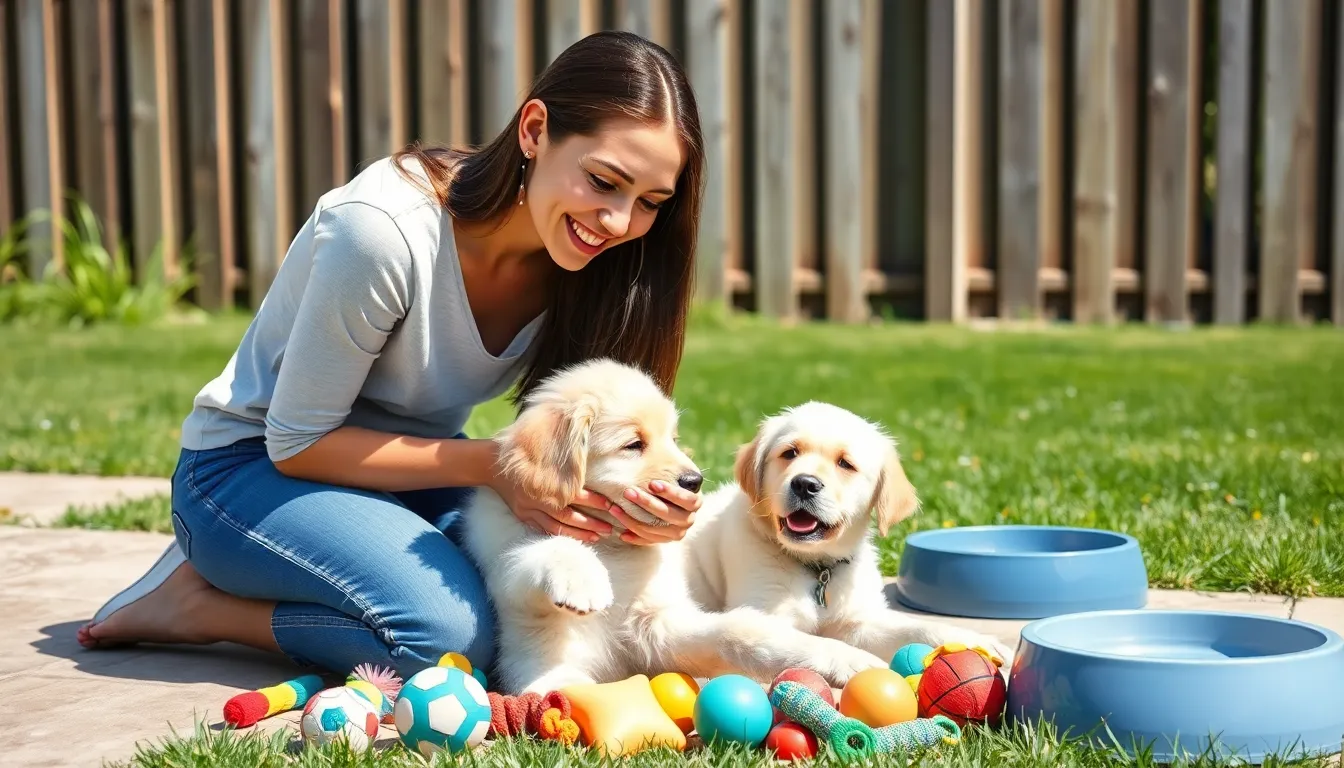Table of Contents
ToggleEvery pet owner knows that furry friends come with their own set of quirks and challenges. From the moment that adorable puppy or mischievous kitten enters their life, they’re in for a wild ride. But fear not! With the right pet care tips, they can transform their home into a pet paradise.
Essential Pet Care Tips
Pet care involves thoughtful decisions and understanding specific needs. These essential tips support a positive experience for both the pet and owner.
Choosing the Right Pet for Your Lifestyle
Selecting a pet requires careful consideration of lifestyle. Active individuals may prefer energetic breeds such as Labrador Retrievers or Border Collies. Those with a busier schedule might find lower-maintenance pets, like cats or small rodents, better suited. Additionally, consider the size of the living space. Apartments often accommodate smaller pets, while larger pets thrive in homes with ample outdoor space. Assessing family dynamics also plays a key role; children and pets should complement each other for a harmonious environment.
Understanding Your Pet’s Needs
Understanding a pet’s needs ensures a happy coexistence. Each species demands unique requirements, including proper nutrition, exercise, and mental stimulation. Dogs typically need daily walks and interactive playtime, while cats benefit from climbing structures and independent exploration. Regular veterinary check-ups promote health and prevent disease. Socialization remains crucial for dogs; exposing them to various environments shapes their behavior. Providing a safe space within the home offers comfort and security, contributing to overall well-being. Recognizing signs of stress or illness enables timely interventions, ensuring the pet’s optimal health.
Daily Care Practices

Daily care practices play a vital role in maintaining the health and happiness of pets. Owners can create a routine that meets their pet’s specific needs.
Feeding and Nutrition
Feeding pets a balanced diet ensures appropriate growth and energy levels. Pet owners should consult veterinarians about suitable food options, including age-appropriate and breed-specific diets. Measuring portions helps prevent obesity. Fresh water must always be available for hydration. Treats can be given as rewards during training but should remain limited to avoid excess calories. Reading labels for ingredients and nutritional information informs owners about what’s best for their pets. Observing pets for any signs of food allergies or sensitivities promotes better health too.
Exercise and Playtime
Providing regular exercise benefits both physical and mental health. Dogs often require at least 30 minutes of activity daily, while cats enjoy shorter, more frequent play sessions. Engaging in interactive games fosters a strong bond between pets and their owners. Realtors can enhance their pet’s environment using toys that stimulate their senses. Regularly changing toys keeps playtime exciting. Taking pets for walks or runs also allows for social interactions with other animals and people. Creating a consistent schedule for exercise reinforces positive habits and contributes to overall well-being.
Health and Wellness
Maintaining a pet’s health involves consistent veterinary care and preventive measures. These practices can significantly enhance a pet’s quality of life.
Regular Veterinary Checkups
Scheduling routine veterinary checkups is essential. These visits typically occur at least once a year for adult pets and more frequently for young or senior animals. During these checkups, veterinarians assess overall health, perform necessary tests, and check for early signs of diseases. Regular evaluations increase the chances of early intervention, making treatment more effective. Pet owners should maintain a record of vaccinations and test results to facilitate discussions with veterinarians about any emerging health concerns.
Vaccinations and Preventive Care
Vaccinations protect pets from numerous infectious diseases. Core vaccines, such as those for rabies, distemper, and parvovirus, require an initial series followed by boosters. Non-core vaccines may be recommended based on lifestyle factors. Preventive care also includes parasite control to guard against fleas, ticks, and heartworms. Monthly treatments can reduce risks, ensuring pets remain healthy and comfortable. Discussing lifestyle habits with a veterinarian helps determine the best vaccine schedule and preventive measures for each pet’s individual needs.
Grooming Techniques
Grooming plays an essential role in a pet’s overall health and comfort. By implementing effective techniques, pet owners can maintain a clean and happy companion.
Bathing and Brushing
Bathing should occur based on the pet’s coat type and activity level. Dogs often benefit from baths every one to three months, while cats generally groom themselves more frequently. Use shampoos designed specifically for pets to avoid skin irritation. Brushing complements bathing by removing loose fur and preventing matting. Short-haired breeds may require brushing once a week, while long-haired varieties often need daily attention. Regular brushing aids in monitoring skin health and establishing a stronger bond between the pet and owner.
Nail Trimming and Ear Cleaning
Nail trimming maintains a pet’s comfort and mobility. Trimming should occur every three to four weeks, depending on the pet’s activity level. Use clippers specifically designed for pets to ensure safety. For ear cleaning, examine the ears regularly for dirt or wax buildup. Cleaning methods may involve specialized pet ear wipes or gentle ear cleaners recommended by a veterinarian. Establishing a routine for these tasks prevents discomfort and promotes the pet’s overall well-being.
Behavioral Training
Behavioral training plays a crucial role in fostering a well-mannered pet. Developing good manners starts with teaching basic commands and ensuring proper socialization.
Basic Commands and Obedience
Teaching basic commands enhances communication between pets and owners. Sit, stay, and come are essential commands that promote safety and obedience. Regular practice reinforces these commands in various environments. Utilize positive reinforcement, such as treats or praise, to encourage desired behavior. Consistency during training sessions helps solidify understanding, making it easier for pets to respond accurately. Short training sessions, lasting about five to ten minutes, ensure engagement and reduce frustration. Beginners may find group classes beneficial for added structure and social interaction.
Socialization Tips
Socialization is vital for a pet’s emotional health and behavior. Exposing pets to different people, animals, and environments contributes to confidence. Start early with puppies and kittens, introducing them to various situations gradually. Safely socialize pets by organizing playdates or enrolling them in training classes. Positive experiences during socialization create a foundation for good behavior. Avoid overwhelming situations, allowing pets to acclimate at their own pace. Regular interactions throughout their lives keep pets well-adjusted and adaptive to changes in their surroundings.
Embracing the responsibilities of pet ownership can be both rewarding and challenging. By implementing effective pet care tips, owners can cultivate a nurturing environment that promotes their pets’ health and happiness. Prioritizing nutrition exercise and regular veterinary visits lays the groundwork for a long and fulfilling life together.
Additionally fostering good behavior through training and socialization helps pets thrive emotionally and mentally. With dedication and love pet owners can enhance their furry companions’ quality of life while enjoying the countless joys that come with pet ownership. Taking these steps ensures a harmonious bond that benefits both pets and their humans.


